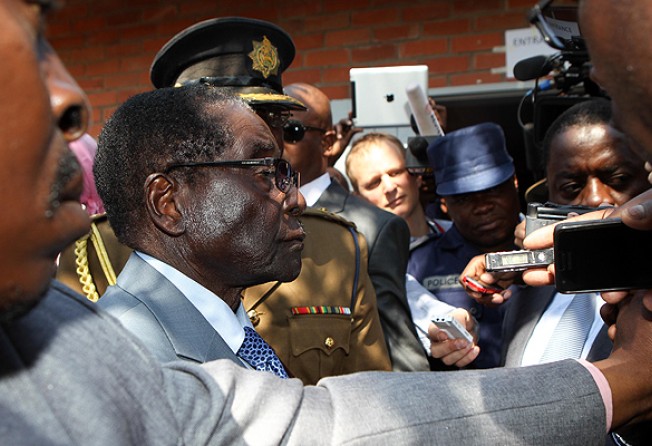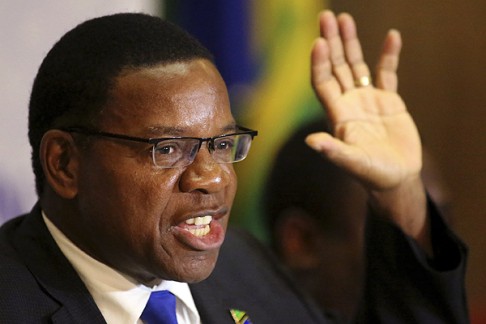Mugabe party wins huge majority in Zimbabwe parliament
Neighbours urge calm as Mugabe's ZANU-PF party surges ahead in Zimbabwe poll

Zimbabwe’s neighbours urged calm on Friday following a fiercely disputed election that looks set to extend Robert Mugabe’s 33-year rule and give him a thumping parliamentary majority.
Full results have yet to be announced, but President Robert Mugabe’s camp has already claimed a shock landslide win that has left the opposition reeling.
With 186 of 210 constituencies counted after Wednesday’s poll, the 89-year-old’s ZANU-PF party already has a commanding lead, officially garnering 137 seats in parliament.
But a ZANU-PF politburo member told reporters the party had in fact already surpassed the 140 seats needed to amend the constitution.
“We have already gone beyond two-thirds. It’s a super majority,” the top party official said on condition of anonymity.
“Our opponents don’t know what hit them,” party spokesman Rugare Gumbo earlier told reporters. “The president might likely get 70 to 75 per cent.”
Mugabe’s opponent and longtime foe Morgan Tsvangirai has described the vote as a “sham” and a “huge fraud.”
He now faces the political battle of his life.
His Movement for Democratic Change has vowed not recognise the results, or the new government, amid rapidly escalating tensions.
In a bid to head off rising anger, the 15-member southern African bloc SADC implored “all Zimbabweans to exercise restraint, patience and calm.”
“The future of your country is in your hands.”
The bloc described the vote as “free and peaceful” but refused to echo the African Union’s declaration that it was fair, a move that could anger millions of Tsvangirai supporters.

We have said this election is free, indeed very free. We did not say it was fair ... we didn’t want to jump to a conclusion at this point in time
With 600 observers on the ground, SADC’s verdict and its next steps will be closely watched by western nations barred from monitoring the poll themselves.
SADC negotiated the creation of a power-sharing government in the wake of 2008’s bloody poll.
Foreign diplomats have expressed deep misgivings about a poll they have described privately as non-violent but fundamentally flawed. But there is also an acknowledgement that options are limited.
The independent Zimbabwe Election Support Network reported up to one million voters were prevented from voting in Tsvangirai strongholds.
“SADC and the AU, the international community want to move forward,” said Jakkie Cilliers, director of South Africa’s Institute for Security Studies.
“There is no way that they are going to depose ZANU-PF or Mugabe. It’s going to happen through domestic resistance or upheaval or some type of palace coup eventually.”
So far Tsvangirai has limited his comments to condemnation of the poll, but already there are calls for mass protests, and warnings that may prompt a bloodbath.
Top leaders from his Movement for Democratic Change met Friday to decide their response and are expected to make a full statement on Saturday.
Ahead of the meeting, top MDC official Roy Bennett called for a campaign of “passive resistance”.
“I’m talking about people completely shutting the country down – don’t pay any bills, don’t attend work, just bring the country to a standstill.”
Meanwhile Mugabe’s allies were planning what to do with ZANU-PF’s apparent thumping parliamentary majority.
“The new constitution will need cleaning up,” said Justice Minister Patrick Chinamasa, referring to a text overwhelmingly approved by Zimbabweans in March that introduced term limits and curbed presidential powers.
Chinamasa said Mugabe’s government would also press on with controversial efforts to bring firms under black ownership.
“All the banks are British owned that is why they are refusing to give credit to our people.”
“We are going to continue with our message that our resources must come under the control of the people of Zimbabwe.”
Investors have expressed fears that may mean rolling back the power-sharing government’s efforts to stabilise the economy after crippling hyperinflation and joblessness.
“It’s back to extreme volatility,” Iraj Abedian, the CEO of Pan African Investments, told AFP from Johannesburg.
“We can expect fairly radical positions that will have populist support, but which will have huge implications.”
Abedian said bank seizures would, like land and mining grabs, lead to chaos. “The land grabs caused chaos in the agricultural sector and it took ten years for it to settle down.
“The financial sector would have a similar impact. It would cause chaos, but ZANU-PF and Mugabe seem to like that.”
Mugabe -- Africa’s oldest leader -- is a former guerrilla leader who guided Zimbabwe to independence in 1980 from Britain and white minority rule.
But his military-backed rule has been marked by controversial land reforms, a series of violent crackdowns, economic crises and suspect elections that have brought international sanctions and made him a pariah in the West.
Former union boss Tsvangirai won the first round of voting in 2008, but was forced out of the race after 200 of his supporters were killed and thousands more injured in suspected state-backed intimidation and attacks.
This time around he announced plans to lure back foreign investors, create a million jobs in five years and improve public services in a bid to secure a long-awaited victory.
But some Western analysts said this could be Tsvangirai’s last bid at the top job if the MDC fails to prevent Mugabe sweeping to a seventh term.